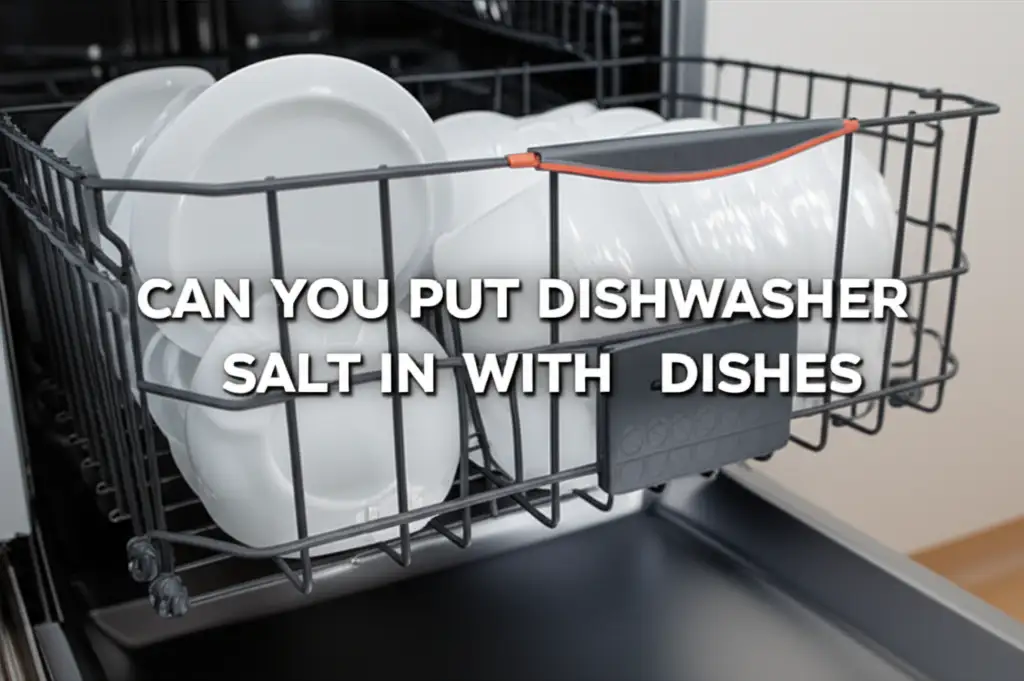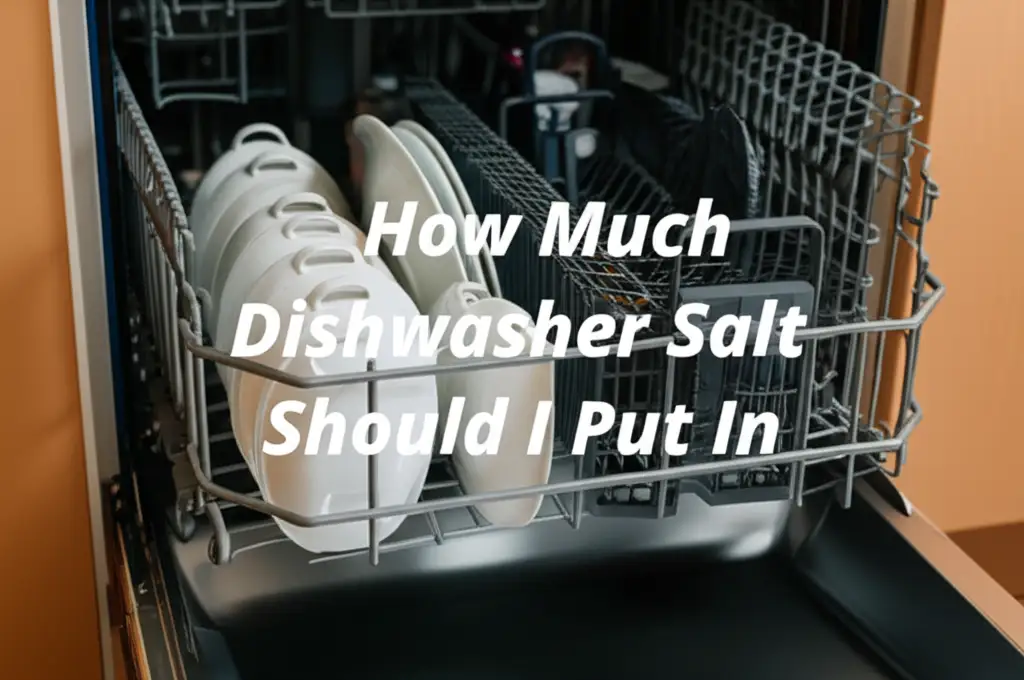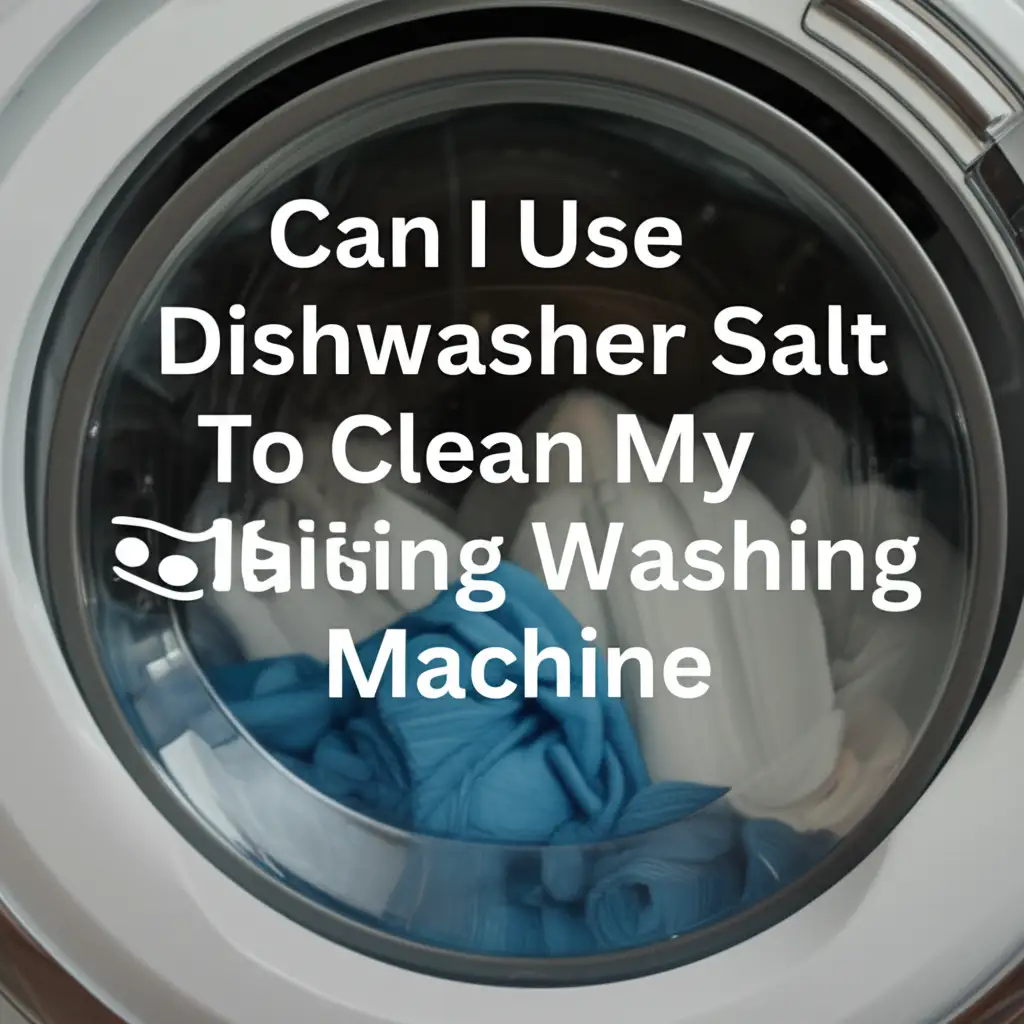· Todd Martin · Dishwasher Care · 10 min read
Can You Put Dishwasher Salt In With Dishes

Understanding Dishwasher Salt: Can You Put It In With Dishes?
Have you ever wondered about the mysterious salt compartment in your dishwasher? Many people ask, “Can you put dishwasher salt in with dishes?” It is a common question, especially when you are aiming for perfectly clean results. Dishwasher salt plays a crucial role in getting sparkling dishes, particularly in areas with hard water. Understanding its function and proper use helps prevent issues like spots and film.
This article will explain exactly why dishwasher salt is essential. We will cover its dedicated purpose and how it works within the appliance. You will learn the correct way to add it and discover what happens if you misuse it. My goal is to guide you toward optimal dishwasher performance and truly spotless dishes.
Takeaway:
- Never put dishwasher salt directly in with your dishes or in the detergent dispenser.
- Dishwasher salt goes into a dedicated, separate compartment within the dishwasher.
- Misplacing the salt can damage your dishes and the appliance itself.
No, you cannot put dishwasher salt directly in with dishes. Dishwasher salt must go into its specific, dedicated compartment inside the dishwasher. Placing it with dishes or in the detergent dispenser can lead to etching, damage to your glassware, and even harm to the dishwasher components over time.
The Essential Role of Dishwasher Salt
Many homes deal with hard water. Hard water contains high levels of minerals like calcium and magnesium. These minerals cause problems for dishwashers. They leave unsightly spots and a cloudy film on your dishes and glassware. Limescale can also build up inside the appliance itself.
Dishwasher salt is a special, coarse-grained sodium chloride. It is designed to regenerate the water softening unit inside your dishwasher. This unit contains ion-exchange resin. The resin traps hard water minerals. The salt then flushes these minerals away, allowing the resin to soften more water.
This process ensures your dishwasher always uses soft water. Soft water prevents mineral deposits on your dishes. It helps your detergent work more effectively. Without proper dishwasher salt, your dishes will not come out as clean. You might see white residue or dull-looking items. For more details on common issues, consider reading about why there is residue on your dishes after dishwasher. The salt makes a big difference for truly spotless results. If you are curious about similar applications, you might wonder can I use dishwasher salt in my water softener.
Why Dishwasher Salt Has a Dedicated Compartment
Every dishwasher designed for hard water areas includes a special compartment for salt. This is not by accident. The salt needs to dissolve slowly and in a controlled manner. It specifically interacts with the dishwasher’s internal water softening system. This system is separate from the washing cycle that cleans your dishes.
The salt compartment is usually a screw-top cap located at the bottom of the dishwasher tub. It is often near the drain filter. When you fill this compartment, water from the dishwasher fills it up. The salt slowly dissolves into this water. This creates a brine solution.
This brine solution then flows into the ion exchange resin. It flushes out the trapped calcium and magnesium ions. This regenerates the resin, allowing it to continue softening incoming water. This process happens at specific times during the wash cycle, not constantly. If you want to know more about adding salt and other agents, learning how to put rinse aid and salt in dishwasher can be very helpful.
What Happens If You Put Dishwasher Salt Directly with Dishes?
Putting dishwasher salt directly in with your dishes is a serious mistake. This is because dishwasher salt is pure sodium chloride. It is not like detergent or rinse aid. It is highly concentrated. If it comes into direct contact with your dishes during a wash cycle, it can cause immediate damage.
One major issue is glass etching. The concentrated salt solution can permanently dull or cloud your glassware. This damage is irreversible. Your glasses will look permanently foggy, even after rinsing. The abrasive nature of the salt crystals can also scratch delicate surfaces.
Direct contact can also damage metal items. It can lead to corrosion or rust on your cutlery and pots. Furthermore, the salt is not designed to dissolve quickly in the wash water like detergent. It may not dissolve completely. This leaves behind a powdery residue on your dishes. This residue is unsafe for consumption. It also creates a bitter taste if left on eating utensils. Always ensure you are using the right products to avoid residue on your dishes after dishwasher.
The Right Way to Add Dishwasher Salt
Adding dishwasher salt correctly is simple once you know where it goes. First, locate the salt reservoir. This is typically a large, screw-cap opening at the bottom of the dishwasher tub, usually on the left or right side. You might need to remove the lower dish rack to access it. Unscrew the cap to open the compartment.
Most dishwashers come with a special funnel for adding salt. If you do not have one, a kitchen funnel works just as well. Place the funnel into the opening. Pour the dishwasher salt into the funnel until the compartment is full. Some water will likely spill out as you add the salt. This is normal. It shows the compartment was already full of water.
Screw the cap back on tightly. It is a good practice to run a quick rinse cycle immediately after filling. This washes away any spilled salt crystals from the tub. This prevents corrosion of metal parts inside the dishwasher. Check your dishwasher’s manual to understand how to know how much dishwasher salt to use and how often to refill. Using specific brands like Finish salt is also straightforward; learn how to use Finish salt for dishwasher.
Common Misconceptions About Dishwasher Salt
There are several misunderstandings about dishwasher salt. One common one is confusing it with table salt. Dishwasher salt is much coarser and purer. Table salt contains additives like iodine or anti-caking agents. These additives can damage your dishwasher’s water softening unit. They can also corrode internal parts. Always use only dedicated dishwasher salt.
Another misconception is that it acts as a cleaning agent. Dishwasher salt does not clean dishes. Its sole purpose is to soften the water. It works in conjunction with your detergent. Detergent cleans the food particles. The salt ensures the water quality is optimal for cleaning without leaving mineral deposits.
Some people believe all-in-one tablets remove the need for salt. While many all-in-one tablets contain a salt substitute, it might not be enough for very hard water. Dedicated dishwasher salt provides more effective water softening. It is still recommended in areas with significant hard water. Always check your water hardness levels.
When Dishwasher Salt is Not Necessary
Dishwasher salt is a vital component for many, but not for everyone. If you live in an area with naturally soft water, you might not need to use dishwasher salt. Soft water has very low mineral content. Your dishwasher will not need to soften it further. You can usually find out your local water hardness from your water provider. Many dishwashers also have a water hardness setting you can adjust.
Modern all-in-one dishwasher tablets often contain built-in water softeners. For mildly hard water, these tablets may be sufficient. They combine detergent, rinse aid, and salt substitute in one convenient package. If you use these tablets and your dishes come out sparkling clean without spots or film, then separate dishwasher salt might be unnecessary.
However, if you notice white residue, streaks, or cloudy glassware, even with all-in-one tablets, your water is likely still too hard. In such cases, adding dedicated dishwasher salt is advisable. It boosts the softening power. It helps ensure your dishwasher performs at its best. It will lead to consistently clean dishes.
Maintaining Your Dishwasher for Optimal Performance
Using dishwasher salt correctly is one step toward sparkling dishes. However, overall dishwasher maintenance also plays a big part. Regularly cleaning your dishwasher’s filter is crucial. Food particles and grease can build up in the filter. This reduces cleaning effectiveness and can cause odors. Most filters are easy to remove and rinse under running water.
Properly loading your dishes also impacts cleaning performance. Do not overload the dishwasher. Ensure water spray can reach all surfaces. Avoid blocking the spray arms. Pre-rinsing heavily soiled dishes can also help. For more guidance, see our article on how to prepare dishes for dishwasher.
Finally, using rinse aid is highly recommended. Rinse aid breaks the surface tension of water. This allows water to drain off dishes more easily. It prevents water spots and helps dishes dry faster. Together, dishwasher salt, effective detergent, clean filters, and rinse aid create the perfect environment for spotlessly clean dishes every time. If your dishwasher is not cleaning properly, you might want to look into reasons like why your KitchenAid dishwasher is not cleaning dishes.
FAQ Section
Can I use regular salt instead of dishwasher salt?
No, you must not use regular table salt, rock salt, or any other type of salt in your dishwasher. Regular salts contain additives like iodine or anti-caking agents that can damage your dishwasher’s water softening unit and other internal components, leading to expensive repairs. Dishwasher salt is pure sodium chloride designed for this specific purpose.
How often should I add dishwasher salt?
The frequency depends on your local water hardness and how often you use your dishwasher. Most dishwashers have an indicator light that illuminates when the salt reservoir is low. You should refill the compartment when this light comes on. For very hard water, you might need to refill every 20-30 cycles.
What if my dishwasher salt light stays on after refilling?
Sometimes, the salt light might not turn off immediately after refilling. This can happen if the float mechanism is stuck or if the salt needs time to dissolve slightly to register. Try running a short rinse cycle. If the light persists, ensure the cap is tightly closed. Check out why your dishwasher salt light keeps coming on for more solutions.
Is dishwasher salt necessary for all dishwashers?
Dishwasher salt is necessary for dishwashers in hard water areas. It regenerates the internal water softener. If you have naturally soft water or use all-in-one tablets that sufficiently soften your water, you might not need it. Always check your water hardness and dishwasher manual.
Can dishwasher salt damage my appliance?
When used correctly, dishwasher salt does not damage your appliance. It actually helps protect it from limescale buildup caused by hard water. However, if you add it to the wrong compartment or spill it inside the tub and do not clean it, the corrosive nature of the salt can indeed cause damage to metal parts.
Conclusion
Understanding the proper use of dishwasher salt is key to achieving truly sparkling results. I have explained that you should never put dishwasher salt in with your dishes. Instead, it belongs in its dedicated compartment. This is where it effectively softens water and protects your appliance from mineral buildup. Misplacing the salt can lead to etched glassware, cloudy dishes, and even damage to your dishwasher’s components.
My experience shows that correctly using dishwasher salt, especially in hard water areas, makes a significant difference. It works with your dishwasher’s internal water softening system to ensure every wash cycle uses softened water. This prevents unsightly spots and film, allowing your detergent to work optimally. By following these simple guidelines, you can prolong the life of your appliance and enjoy consistently clean dishes. Take a moment to locate your dishwasher’s salt compartment and ensure it is always filled. Your dishes will thank you for it!
- dishwasher salt
- hard water
- dish cleaning
- appliance care





